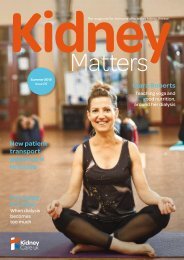Kidney Matters - Issue 9 Summer 2020
Kidney Matters is our free quarterly magazine for everyone affected by kidney disease. This issue includes some advice on keeping busy during lockdown, tips on managing your diet and weight, insight into the life of a carer, and an interview with the fabulous 'Marilyn' (front cover). As well as this the we have some delicious kidney-friendly cherry filo pastry tarts in the Kidney Kitchen and our Kidney Clinic discusses the advantages and disadvantages of prednisolone.
Kidney Matters is our free quarterly magazine for everyone affected by kidney disease.
This issue includes some advice on keeping busy during lockdown, tips on managing your diet and weight, insight into the life of a carer, and an interview with the fabulous 'Marilyn' (front cover). As well as this the we have some delicious kidney-friendly cherry filo pastry tarts in the Kidney Kitchen and our Kidney Clinic discusses the advantages and disadvantages of prednisolone.
You also want an ePaper? Increase the reach of your titles
YUMPU automatically turns print PDFs into web optimized ePapers that Google loves.
20
KQuIP meetings
Have you ever wondered what mechanisms we have in place to identify potential quality
improvements and trigger change in the delivery of our treatment and care? The Kidney
Quality Improvement Partnership (KQuIP) is a partnership of professionals and patients
working together to achieve this goal.
What is Quality Improvement and why is it
important?
Healthcare professionals across the country are
constantly trying to improve things for patients –
whether working out a new rota to offer tailored
appointments, or introducing better waste
management to reduce the environmental impact.
Individuals are working above and beyond their day
job, in an effort to improve patient outcomes, the
system, and the care environment.
What is the difference then, between all of this activity
and ‘quality improvement’? Why do we need skills
in quality improvement (QI), if people are already
working to improve things - should we not all just get on
and join in?
The answer to this can be summed up by a famous
quote from W Edwards Deming – one of the founders
and pioneers of QI:
“Without data, you’re just another person with an
opinion.”
What Deming is trying to get across is that often
we – as humans - have a tendency to think we have
the answer. The trouble is, a problem doesn’t
always have a single answer. And often, if we try and
make something better on our own without fully
understanding things, involving the right people, or
measuring the outcomes, we can get things wrong
- there can be missed opportunities for sustained
improvement (at best) or unintended negative
consequences (at worst).
Healthcare is a complicated system, within which
sit many processes, people and cultures. What a QI
approach gives us, are the tools to deconstruct and
truly understand a problem, plan and test ideas for
improvement, and measure – in real time – the actual
impact of that change.
What does this mean for kidney care?
With Kidney Care UK’s support, KQuIP is using this QI
approach to tackle some of the key issues identified
by the kidney community during co-design events
held back in 2015/16. These were: transplantation,
dialysis at home, and managing vascular access.
Quality Improvement skills are taught alongside
delivering these important projects in the hope that
the same skills can be used in further improvement
projects in the future.
KQuIP meetings
Alongside quality improvement, KQuIP brings two
other elements to improvement work that the
programme sees as key to success: collaboration and
leadership. Bringing renal teams and kidney patients
together through regional meetings has meant the
work has broken out of the usual hospital or trust
boundaries, and teams have been able to share
challenges, ideas and experiences, learning from each
other and pooling their combined expertise.
Highlights:
• A re-designed living-donor and donorrecipient
transplantation pathway in the South
West reducing the number of visits for patients
from over seven, to a maximum of three
• Piloting a standardised electronic transplant
referral form to reduce delays caused by
paper and posted referrals
• The introduction of home haemodialysis
training at satellite units
• The introduction of week-long home therapy
events across the regions including radio
broadcasts, roadshows and education sessions
• Revamping of staff and patient education
to encourage a culture of ‘home first’ for
dialysis across participating units.
• The production of an e-learning course,
based on the national cannulation
recommendations - so far over 88 nurses
from four units in Yorkshire and Humber and
108 nurses from five units in the North West
have enrolled on the course.
kidneycareuk.org

















